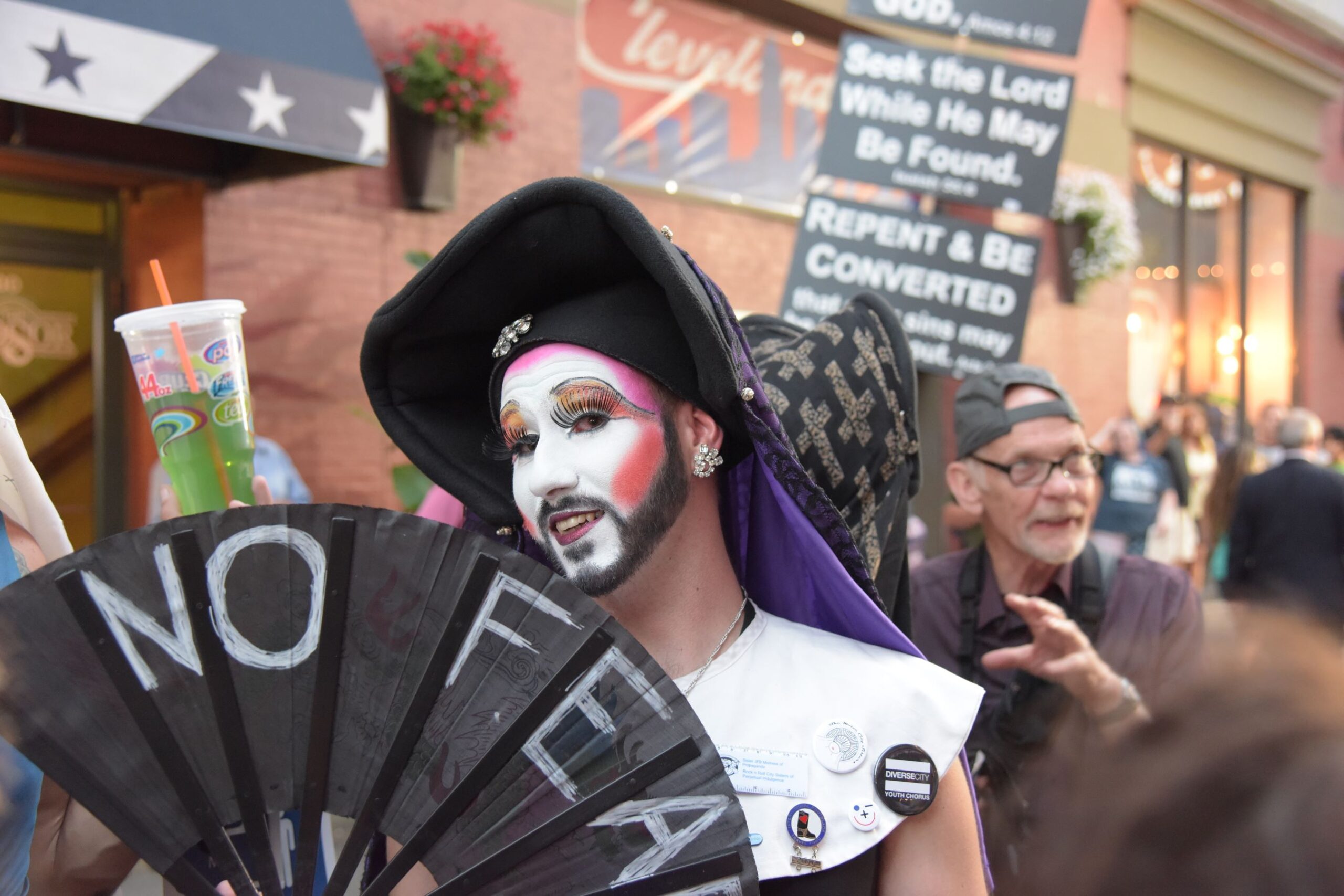
(Shutterstock)
If, like me, you were taught by nuns, and enjoyed the safe rebellion of mocking their strictness…if you watched The Trouble With Angels with a grin of recognition…if you were awed by stories of sisters nursing the enemy in the Civil War or building hospitals for Hansen’s patients when others refused to touch their leprous skin…you may come more slowly to appreciation of the Sisters of Perpetual Indulgence.
They are men, you see, in long habits. Instead of saints’ names, theirs are clever: Sr. Savior Applause, Sr. Polly Amorous, Sr. Phyliss Stein the Fragrant. Their charism is not cloistered prayer or gritty, self-sacrificing work; it is fun. Freedom. Acceptance. In their words: “the promulgation of universal joy and the expiation of stigmatic guilt.”
The Sisters wrote the first sex-positive safe-sex guidelines for gay men. One of the STIs they list is guilt, which they define as a disease you catch from religion and pop culture. At the height of the AIDS crisis, they gave out golden condoms as communion. Dressed in fourteenth-century Belgian habits and “a teensy bit of make-up so as not to be dowdy on a Friday night,” they confronted evangelists, murmuring a litany of intercession that asked for “mercy on the self-righteous who take away our liberty.”
I am not the only one who blinked, trying to take this in. But I am ashamed of my hesitation. Sen. Marco Rubio accused the Sisters of doing the devil’s work with “diabolical parody.” Mike Pence called them anti-Catholic bigots. When the L.A. Dodgers presented them with a community hero award for their service, ministry, and outreach to those on the edges, there was such a kerfuffle, the Dodgers rescinded the award—which caused an even greater kerfuffle, so they reinstated it.
The Sisters have faced social confusion, and animus, all along. Back in 1980, they held a prayer vigil in the Castro district. Uncertain how to cover this, journalists used scare quotes as caveats, reporting that “nuns” had “prayed” at a “vigil” and sang “hymns.”
Undaunted, the order spread around the world; it has houses in Germany, France, Australia, Scotland, Uruguay, Switzerland…. Now it is gaining scholarly street cred; last month, Professor Melissa Wilcox, chair of religious studies at UC Riverside, spoke at Washington University, introduced by an admiring cisgender male professor of the tweed and pipe sort. Her topic: “Dodging the Sisters: Why Queer Nuns Keep Going Viral.”
The parody, Wilcox pointed out, is serious at base. The Sisters offer “a performance in which religion is both troubled and reclaimed.” They are not theologically clueless; one Sister is the son and grandson of Methodist ministers, ostracized from the family religion. Another studied at seminary until he was asked to make “a heterosexual adjustment.”
Wilcox suspects that it makes us nervous to think of nuns having sex. Personally, I always wanted them to experience the joys of the body. Austerity can make people severe and unforgiving. When a young nun I knew became pregnant, I was thrilled for her. What bothered me was the Sisters’ campy send-up. Shows like Sr. Mary Ignatius Tells It All and Sister Act are fun because they use inside humor, winking at the faithful. But did the Sisters have that weird combination of mimicry and scorn I heard when gay friends mocked beauty pageants?
I listened, read, and changed my mind.
The order began on Easter weekend 1979, when three guys donned retired habits (given to The Sugar Plum Fairies for a version of The Sound of Music) and went into the streets of San Francisco, carrying a machine gun for protection. The reaction was, they joked later, like a series of psychological car wrecks: people could not stop staring. There was power in this prank—could it be used as activism?
The founding members were steeped in Catholicism, and they knew what “indulgence” meant. Not the corrupt sort that came later, but the sense of forgiveness. They wanted perpetual forgiveness—for everyone who had been made to feel ashamed of who they were. Others soon joined, burned out by the frustration of more aggressive activism and hungry for joy. And so formed this provocative, deliberately outrageous group of queer and trans nuns.
Here is what made the difference for me: they take vows, and secretly, they take their work seriously, offering the same combination of ministry, nurture, and social justice activism to the queer and trans communities that traditional nuns offer to the rest of us. The Sisters of Perpetual Indulgence throw fabulous parties, parades, balls, and beer blasts—which raise money for AIDS research and care; for LGBTQ youth; for projects to stop the violence of literal gay-bashing; for a rose quartz commemoration at Pink Triangle Memorial Park of all who have died because of ignorance and bigotry.
What is “sacrilege,” anyway? “Violation or misuse of what is regarded as sacred,” the dictionary tells me. But why should fun not be godly? And do lace-up brown shoes and navy polyester dresses better praise the Creator than white theatrical makeup and borrowed habits?
Christianity has been laced with hatred for so very long. Those outside the officially sanctioned boxes have spent their entire lives ashamed, keeping secrets, or hiding from themselves. I prefer the Sisters’ version of confession: “Your sins are forgiven. Go forth and sin some more, because that’s the reality of the human condition.”
Read more by Jeannette Cooperman here.
